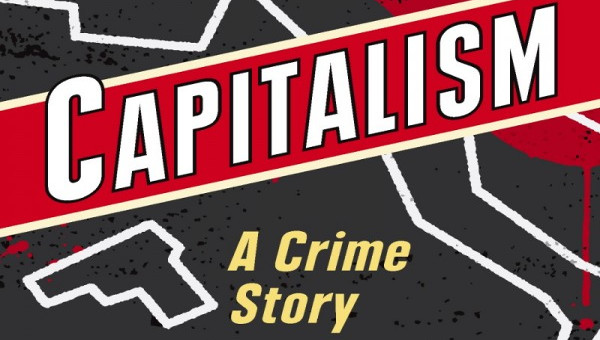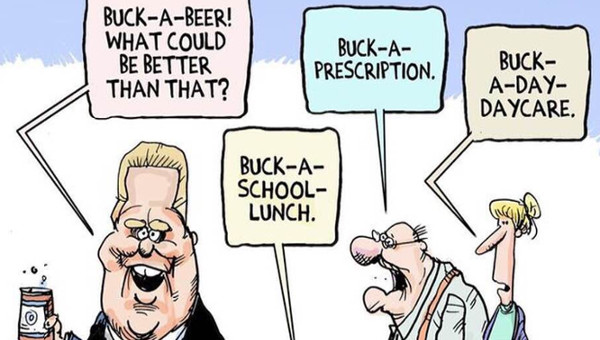Trudeau and SNC-Lavalin: Of Hosts and Parasites
Every now and again the sophisticated web of myths and fantasies that hides the brutality and ugliness of capitalism is ripped away by sleazy and rapacious actors.
1. Trudeau
We are told, again and again, that we are fortunate to live in a capitalist nation that is subject to the Rule of Law. We are free to elect governments whose members may be expected to abide by many of their promises to us and to share our commitment to our foundational institutions. They will accept rulings of an independent judiciary whose processes are accessible to all and which treat all of us as equal before, under and according to our properly passed laws and constitution.
 All of those who want to be elected give us such undertakings and all of them, especially self-proclaimed l[L]iberals like Justin Trudeau, are fond of saying they will go to the wall to defend these liberty-protecting principles. In this setting, we are told by our governments and their intellectual gatekeepers, it is safe to leave the bulk of our wealth generation to private actors whose efforts to accumulate riches will enure to the benefit of all of us as some of the wealth they create trickles down. Inevitably, some of these wealth creators, in their zeal to acquire more and more, violate the tenets of a free market economy, act anti-socially and, often, illegally. Given the presumptions of an independent legal system and the commitment to honour its workings, we can safely expect (so goes the claim) that governments will pursue appropriate civil and criminal actions to deal with such alleged excesses and abuses.
All of those who want to be elected give us such undertakings and all of them, especially self-proclaimed l[L]iberals like Justin Trudeau, are fond of saying they will go to the wall to defend these liberty-protecting principles. In this setting, we are told by our governments and their intellectual gatekeepers, it is safe to leave the bulk of our wealth generation to private actors whose efforts to accumulate riches will enure to the benefit of all of us as some of the wealth they create trickles down. Inevitably, some of these wealth creators, in their zeal to acquire more and more, violate the tenets of a free market economy, act anti-socially and, often, illegally. Given the presumptions of an independent legal system and the commitment to honour its workings, we can safely expect (so goes the claim) that governments will pursue appropriate civil and criminal actions to deal with such alleged excesses and abuses.
It seems as if Trudeau and his government are falling short. Having created a new process, deferred prosecution agreements (DPAs), to deal with some special kinds of abuses, the government stands accused of having tried to influence lawyers charged with the task of maintaining the independence and integrity of the administration of justice. The suspicion is a strong one not only because of the facts surrounding the controversy but because we all know, in our heart of hearts, that, much as our elites protest that we live in a mature democracy and under the Rule of Law, Trudeau, his government and any other government we are allowed to choose, know that their primary job is to advance the interests of capital; everything else, all that Rule of Law and electoral responsibility stuff, is secondary.
Within liberal democracy there is a cancer. The sphere of one person, one vote, is infected by the logic and power of the one dollar, one vote regime that rules capitalism’s favourite vehicle, the for-profit corporation. That cancer eats away at liberal democracy’s flesh, often reducing liberal democracy to a muscle-less skeleton.
2. SNC-Lavalin
The cancer here is SNC-Lavalin. It is a very large incorporated business. Its capital value is roughly $10-billion. Its web page boasts that it is a globally fully integrated professional services and project management company and the owner of much infrastructure. Among the many local projects in which it has been involved in recent years are Highway 407 in Ontario, the New Brunswick portion of the Trans-Canada Highway, the William R. Bennet Bridge in Kelowna, the Eglinton LRT in Toronto, and the Jacques Cartier Bridge and the McGill University Healthcare Centre in Montreal. Abroad it has offices in at least 50 countries and operates for-profit activities in 160 states.
It is involved in a lot of wealth creating activities. It should be showering benefits on us all. But its wealth generation is tainted by many anti-competitive, anti-market and anti-social acts. For instance, governments have brought charges of improper payments to get contracts to build the Jacques Cartier Bridge (and which the recipient has pleaded guilty to accepting a covert payment from SNC-Lavalin) and McGill University Healthcare Centre (to which a former CEO of SCN-Lavalin pleaded guilty and was let off with a gentle rap on the knuckles and some other executives were convicted and got minor jail time).
Abroad, the record was even uglier, bribery in Kerala, India being alleged (but not proved) and similar business-getting tactics used in Bangladesh and Libya. The Libya dealings attracted the most attention, involving the allegations that SNC-Lavalin had thought it useful to fork over $48-million to the West’s then favourite whipping boy, Muammar Gaddafi, pay for lavish family outings, for which the company got contracts to build a dam, an airport and a prison. In the process, it was estimated that Libyan organizations were robbed of some $130-million.
These overseas shenanigans were enough for the World Bank – an institution that knows something about pork-barreling! – to ban SNC-Lavalin and 100 named subsidiaries from bidding on World Bank contracts for ten years. SNC-Lavalin had been coining profits from all this wheeling and dealing, for, make no mistake, like any other for-profit capitalist, it is not a charitable organization. It does not offer commissions and kick-backs unless it stands to gain. What is notable is how little money needs to be spent to make a great deal. For instance, the recipient of the kick-back on the Jacques Cartier Bridge contract acknowledged getting $2.3-million to help SNC-Lavalin get a contract worth $127-million.
In summary, SNC-Lavalin has profited hugely from anti-competitive, anti-social conduct. Those profits have been enjoyed by its investors, the shareholders. We will never get those monies back from them. These are facts of capitalist life. Bribery to yield profits is as common as snow in a Canadian winter. For instance, GlaxoSmithKline (British pharmaceutical) has been fined for the systematic maintenance of a massive bribery network; JPMorgan (U.S. investment bank) allegedly paid $80,000 a month to the Chinese premier’s daughter to obtain favours, etc. (Glasbeek, 2017). Shareholders are more than happy to be recipients of stolen wealth.
Corporations are vehicles for the private accumulation of socially produced wealth. Their thinking and acting are done by directors and executives. They, in turn, are informed by the ceaseless drive for profit maximization by shareholders who, legally, cannot be held responsible for the conduct of the corporation’s business. They can appoint and dismiss directors and executives. They can reward them for increasing profits and punish them for their failure to do so. The scheme is one which invites, indeed promotes, aggressive, anti-social, and worse behaviour. The corporation for-profit is a legally created site of irresponsibility. SNC-Lavalin is merely illustrative of the problem. It is not an aberration.
3. The Sleaze
All these SCN-Lavalin excesses and abuses frequently made the press as they occurred regularly and repetitively. Thus, the Libyan rip-offs extended over the period 2001 to 2011. The World Bank outed and disqualified SNC-Lavalin as a bad actor in 2013. In 2011, news reports surfaced to tell us that the RCMP had begun an investigation into allegations of corrupt behaviour by SCN-Lavalin. Yet, despite this news, the Globe & Mail has reported that the corporation continued to receive support from the federal agency Export and Development Canada (EDC). The figure it cited was $1.7-billion for SNC-Lavalin to go out and do business in foreign lands where it reputedly cheated and chiselled. Despite the scandals and foreign sanctions, from our government’s, the corporation’s and the investing capitalists’ perspective, it was business as usual. It was not until 2015 that charges were laid under Canada’s Criminal Code and The Corruption of Foreign Officials Act in respect of the Libyan adventures. Now surely, as we are told to expect, the federal government would recoil in horror and bemoan the fact that a Canadian corporation had betrayed the core values of our liberal laws and social standards. But…
In 2016, shortly after the RCMP launched its charges, discussions were initiated to consider the introduction of an addition to the Criminal Code that would permit the Crown to enter into an agreement with an accused corporation to undertake remediation processes that would prevent it from committing offences in the future. If such an undertaking was acceptable to a court, no conviction would be registered. The agreement might require the corporation to pay fines and compensation. The discussions were intensive and took quite a while. Among those eager to see such legislation enacted was SNC-Lavalin. In 2018, a deferred prosecution agreement (DPA) set of provisions was jammed into an omnibus Act. They could be found in Bill C-74, following amendments to CPP legislation and preceding some provisions pertinent to the imposition of a duty on cannabis. It became law on 19 September, 2018. As ‘luck’ would have it, SNC-Lavalin’s criminal trial had been scheduled to commence on 10 September, 2018 but an adjournment had been granted. SNC-Lavalin was now in position to ask that the prosecution enter into a deferred prosecution agreement (a DPA) with it, as the provisions in Bill C-74 were now law, and they had been enacted to have retroactive effect, that is, they were to apply to events that occurred before their passage.
As is now well-known, the then Attorney-General, Minister Jody Wilson-Raybould, was not willing to exercise the discretion she had to deploy this new tool in the SCN-Lavalin matter, despite that corporation’s and the government’s blandishments. In a letter to the public, the corporation has pleaded that it be allowed to negotiate a deferred prosecution agreement, as a successful prosecution on the basis of traditional criminal charges would not achieve much. After all, the letter noted, the corporation could not be sent to jail. What good would a conviction that carries a jail sentence do? The only people harmed would be stakeholders.
The corporation’s letter suggested that it would be fine if individual executives and employees were criminally prosecuted, but the corporation should be left free to do what it did best. It was a wealth creator, and it already had instituted new and world-class ethical and compliance measures. The leadership of our government agrees with SNC-Lavalin. It has acknowledged that it was lobbied – sorry, let us make that advised and spoken to – by business interests, politicians (including Premier François Legault of Quebec) and some union leaders, all expressing a preference for a deferred prosecution agreement over Criminal Code and Corruption of Foreign Officials prosecutions. Naturally, it had discussed the matter with relevant politicians and public officials. It all sounded so reasonable. But, the government’s response has become controversial.
The demotion and then the resignation of Minister Wilson-Raybould, the transparently deceptive explanations (‘she does not speak French’, the resignation of another member of the government ‘forcing a government shuffle’), the refusal to give the media access to the players, the turning of Sunny Days Trudeau into Dodging and Dodgy Trudeau, all contribute to a widely held suspicion that the Liberal government has not lived up to the liberal values which give our political economy legitimacy. Government is supposed to respect and defend the independence of our legal institutions, not undermine it. This principle is considered so elemental that we have made it a crime to interfere with the legal system’s proper operations. Its name, obstruction of justice, reflects the strength of our desire to uphold the autonomy of the legal regime. The offence carries a hefty maximum penalty.
Trudeau and his allies argue strenuously that they would never obstruct justice, that their conversations with each other and with the Attorney-General were just that: conversations that necessarily take place between appropriate Ministers and their advisors. Of course, Trudeau and his allies cheerfully acknowledge that, should such consultations lead to undue influence being exercised over the justice system, a wrong would have been committed. He contends that he never crossed that line and to support his claim he has shown his willingness to let a legislative Ethics committee vet his and his advisors’ conduct. This argument is not that convincing, given the passage of the DPA legislation, its timing, its retroactivity, the treatment of the stiff-necked (or, better, righteous?) Wilson-Raybould, and given the fact that SNC-Lavalin, among its many transgressions and anti-social behaviours, has also been involved in making illegal contributions to the coffers of provincial and federal political parties.
It is also noteworthy that the oft-trotted-out claim by SNC-Lavalin/Trudeau defenders that squeaky clean Canadians must bribe culturally different foreigners to do business with them is unpersuasive. SNC-Lavalin felt it had to bribe non-foreigners as well. Given all these unseemly circumstances, all this sleaze surrounding the issues, there are serious concerns about the government’s commitment to the independence of the justice system and what this means to our political belief system.
It is crucial to the Canadian polity for its citizens to believe in their ability to elect governments who will be bound to apply the law even-handedly to all of us, poor and rich alike. The Rule of Law with its separation of law (based on rational and established criteria) from politics (based on irrational exercises of power) is pivotal to the legitimacy of our system of governance because it allows us to protect our deepest shared values from the self-serving political expediency of momentary rulers. The SNC-Lavalin/Trudeau controversy threatens to make visible a truism: while Canadians are eager to believe that they live in a liberal capitalist democracy, the only word that really matters in that descriptor is capitalist.
4. The Nature of the DPA Legislation
The legislation is based on schemes devised to re-educate and rehabilitate juvenile delinquents. There, the idea is to treat the conduct of young people more as a mistake than a serious crime. Immaturity and living circumstances are blamed for deviant behaviour, and the hope is that, before it is too late, these juveniles can be turned into responsible and productive adults. The stigma and harshness of criminal law are perceived to be counterproductive. Kids should be saved, if at all possible. Our government believes that some very mature corporations that have committed serious wrongs ought to be treated as if they were errant children. To this end, it gave prosecutors a new tool to add to their criminal law kit.
Whether or not prosecutors ought to use the new tool is, as so many of their powers are, to be left to their discretion. Prosecutors may decide on the basis of the evidence that they have and other considerations not to lay any charges at all, or some specific charges rather than others, to pass any evidence they had gathered to administrative regulators whose mandate covers a similar area of regulation and/or to permit victims of alleged wrongdoing to bring civil actions to recoup their losses and to be vindicated by a court. It is this exercise of discretion, based on established policies, experience and good faith, which is to be protected, which forbids interference by political masters. Why, then, did the Trudeau government feel it necessary to give a new discretionary power to prosecutors (prosecutors already possessed of a lot of weaponry), one which would apply only to corporations? Several reasons suggest themselves.
First, a number of other jurisdictions already have enacted DPA-type legislation, most pertinently the UK and the USA. We like to be in synch and, as the legislation is specifically to apply only to fraud and bribery cases, it will serve as one of Canada’s responses to international pressure to do something about tax evasion, money laundering and financial fraud. This could refurbish our reputation, as Canada is considered a laggard when it comes to fighting transnational skulduggery. From this perspective, the DPA legislation is about being seen to do something without doing much of substance. As ‘luck’ would have it, the DPA provisions are not very threatening to the corporate sectors. They merely require corporate offenders to acknowledge their wrongdoing, pay some money and undertake not to do it again. They are soft laws, as their equivalent juvenile delinquent laws were intended to be. It is probable that the makers and shakers at SNC-Lavalin and its fellow travellers know this full well. The history of like provisions in the UK and the U.S. is not intimidating to them. Thus, the New York Times reports that over a 15-year period, 51 banks had entered into such agreements and had to enter into similar agreements again after they had violated the same laws that had led to the earlier agreements.
Unsurprisingly, SCN-Lavalin is lobbying fiercely for the dropping of the Criminal Code and the Corruption of Foreign Officials charges. It asks that it should be allowed to negotiate a DPA which will put the corporation on the hook. If criminal charges are to be brought, they should aim at executives and employees. This is a quirky variant of the usual position when corporate activities initiated by executives attract criminal prosecutions. When criminally charged, senior executives frequently offer to have the corporation plead guilty as long as they, the shakers and makers, are left off the hook. After all, nailing the corporation only costs money. It may lead to a loss of reputation and some loss for the shareholders, although the shareholders will not be required to return any of the gains they have made when the executives caused the corporation to act wrongfully; indeed, they may not be shareholders by the time all this occurs. There may also be losses for small creditors and hardship for some workers. To most, now off the hook, executives and shareholders, these are acceptable collateral damages. Note here that SNC-Lavalin and Trudeau claim to be truly concerned about the fate of workers should the DPA solution be rejected. Hypocrisy is not in short supply. To return: this wheeling and dealing by the executive class to hide behind the corporation is one of the main reasons so few executives go to jail, in fact, are rarely prosecuted. However, this time, senior executives are making the corporation beg to be the one singled out for action, but not to save other executives and directors. This time they are seeking to serve the corporation and, incidentally and more generally, the purposes of rapaciously corrupt and corrupting capital.
DPAs require a corporation to acknowledge its wrongdoing, to promise not to do it again and to accept some monitoring over its activities. But it can continue to engage in the same profit-making business because it has not been criminally convicted of doing something seriously wrong. In this case, that means that SNC-Lavalin would be allowed to continue to bid for government contracts and remain eligible for government EDC hand-outs. This way of getting a leg-up in its chase for profits, rather than engaging in fierce market competitive battles, is its preferred business model. It is one that has historically led to bribery and other abuses, and threatens, as a model, to lead to more bribery and fraud. The negotiation by a government of a DPA in this case will endorse this inherently anti-social way of doing business, not just for SNC-Lavalin but for all major firms. To these avaricious actors, the benefits of getting to ‘yes’ makes the sacrifice of a few executives and employees worthwhile.
This is why Trudeau was lobbied, as he noted, not only by SNC-Lavalin, but other business leaders, Quebec politicians (and Quebec’s needs and dependency are, of course, significant factors in this controversy) and even unions. They all want the present state of affairs, the production of profits, whether obtained according to Hoyle or not, to continue. He was asked to concede that our legal and political pretensions only extend as far as capital says they do. While Trudeau contends that he did not unduly pressure the former Attorney-General, he does acknowledge that he would dearly have liked her to take a different approach, a more realistic one, one that accepted the paramountcy of the aggressive search for profits by private accumulators who might not care too much for the niceties of law.
“The supposed Trudeau mis-steps threaten to reveal to the public that the liberalism and democracy they have is not to be allowed to constrain capitalism’s ceaseless drive for private accumulation of socially produced wealth.”
SNC-Lavalin and Trudeau both stress the importance of corporations like SNC-Lavalin to continue to do business as if nothing too untoward had happened. It might mean that we have to swallow a bitter pill: we might have to accept a business model which is inherently criminogenic. That way, the Trudeau backers say, workers might stay employed; legally irresponsible shareholders will continue to invest; ill-gotten export dollars will continue to be earned; why, we might even collect some taxes.
The fuss is not so much about whether Trudeau is just another politician with feet of clay whose political machinations are leading him to use unseemly duck and cover manoeuvres. It is the underlying, but not clearly articulated, issues that are unsettling. They may push a population, fiercely desirous of believing that it lives in a mature liberal democracy, to re-think that belief system. The supposed Trudeau mis-steps threaten to reveal to the public that the liberalism and democracy they have is not to be allowed to constrain capitalism’s ceaseless drive for private accumulation of socially produced wealth.
Even if Trudeau is found not to have exercised his political power wrongfully (as the Ethics committee is likely to find), his sin (from a thinking capitalist perspective) is that, in acting as he has and defending his conduct the way he has, he is implicitly acknowledging that capitalism is ugly, that capitalists commit crimes and that this should be hidden, if possible, and tolerated, if not.
It is not a pretty picture, but to anti-capitalists it could be a useful one. They might find fertile ground for the argument that, when the SNC-Lavalins of the world cheat and lie, they forfeit their right to exist as well as their assets, as is done when we deal with people that we like to label members of gangs and racketeers. These assets could be used for socially acceptable purposes, saving the jobs which, according to the Trudeaus of the world, can only be saved by allowing rapacious capitalists to satisfy their greed by hook or by crook. It is worth a try. •





